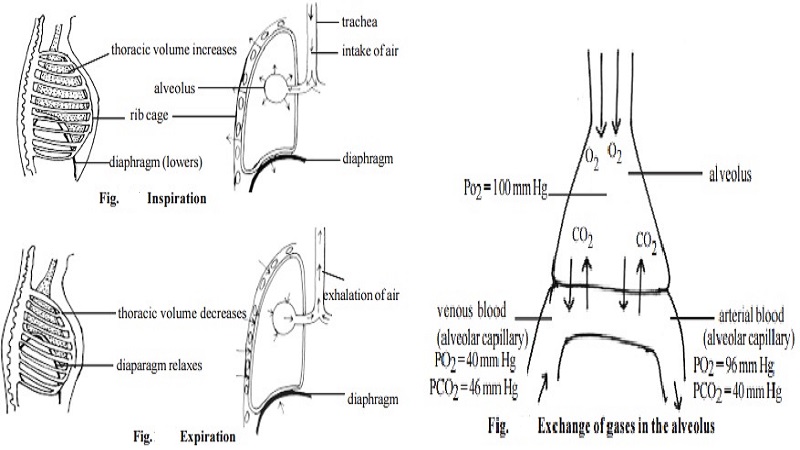Chapter: 11th 12th standard bio zoology Human Body higher secondary school
Lungs Disease : Tuberculosis (TB), Herring - Breuer reflex, Acute and Chronic Bronchitis

Lungs Disease : Tuberculosis (TB), Herring - Breuer reflex, Acute and Chronic Bronchitis
Tuberculosis (TB)
It is an infections disease, caused in humans by the bacterium Mycobacterium tuberculae. It was once common world wide and was a killer disease. People infected with HIV are highly susceptible to tuberculosis and the disease is becoming more common again in communities with high rates of HIV infection.
Causes :- Infection is caused by airborne droplets (produced by coughing or sneezing). The bacteria breathed into the lungs multiply to form an infected 'focus'. In a high proportion of cases, the body's immune system then halts the infection and healing occurs. The infection can also occur in intestines, bones and kidneys.
Symptoms : The main symptom includes coughing (sometimes bringing up blood) chest pain, shortness of breath, fever and sweating (at night) poor appetite and weight loss. The main complications of tuberculosis of the lungs are pleural effusion. (Collection of fluid between the lung and the chest wall).
Bronchitis
Bronchitis is the inflammation of the bronchi, the air ways that connect the trachea (wind pipe) to the lungs, resulting in cough that may produce considerable quantities of sputum (Phlegm). Two forms, of the disease are recognized as acute bronchitis (sudden onset and short duration) and chronic bronchitis (Persistent over a long period and recurring over several years). Both are more common in smokers and in areas with high atmospheric pollution.
Acute bronchitis : It is caused by viral infection or by the effect of air pollutants. Bacterial infection may cause acute bronchitis. Attacks occur more often in winter. Smokers, babies, the elderly and people with lung diseases are particularly susceptible.
Chronic Bronchitis :
It is a form of bronchitis in which sputum is coughed up on most days for atleast three consecutive months. The disease results in narrowing and obstruction of the air - ways in the lungs. It often coexists with another form of lung disease, emphysema (widening of alveoli). Chronic bronchitis and emphysema together are called chronic obstructive lung disease (COLD) or chronic obstructive airways disease.
Causes : Pollution and smoking are the causes of chronic bronchitis. It stimulates the production of mucus in the lining of the bronchi.
Herring - Breuer reflex.
When the alveoli are stretched at the height of inspiration the receptors send stimuli to the expiratory center of the medulla through the vagus nerve which inhibits further inspiration. This sequence of events is called Herring - Breuer reflex.
In addition the medulla contains a pneumotaxic center which is connected to the breathing centre and helps to ensure rhythmic breathing. During inspiration, the inspiratory part of the respiratory center sends impulses to the pneumotaxic center which responds by sending impulses to the expiratory part of the respiratory center. The expiratory center is then activated and so the inspiratory center is inhibited reflexly, respiratory rhythm is controlled in this manner by these centers in the brain.
Pneumonia :
Inflammation of the lungs due to infection is called pneumonia. Pneumonia is caused by viruses or bacteria.Viral pneumonia is due to adenovirus, respiratory syncytial virus or a coxsackie virus. The most common bacterial pneumonia is Pneumococcal pneumonia. Pneumonia may also be caused by a mycoplasma (an organism that is intermediate between a bacterium and a virus)
Symptoms and Signs : Symptoms and signs include fever, chills, shortness of breath and a cough that produces yellow - green sputum and occasionally blood.
Treatment : The drugs prescribed depend on the causative microorganism. They may include antibiotic drugs or antifungal drugs. Aspirin or paracetamol may be given to reduce fever. Oxygen therapy and artificial ventilation may be required.
Related Topics